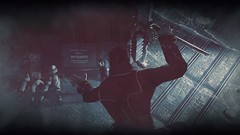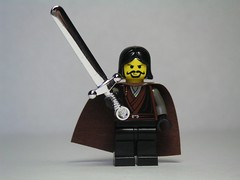 In my ongoing quest to waste lunch breaks catching up on electronic entertainment, I spent the past few weeks playing Dishonored (content warning), Arkane Studios' hacky-slashy, dash-n-skulk first person sneaker that garnered a bucketful of awards in 2012.
In my ongoing quest to waste lunch breaks catching up on electronic entertainment, I spent the past few weeks playing Dishonored (content warning), Arkane Studios' hacky-slashy, dash-n-skulk first person sneaker that garnered a bucketful of awards in 2012.The title takes place in plague-ridden Dunwall, which is sort of an alternate-history London with steampunk science, a religion informed by ancient stoicism, and a trickster god on the loose with his own inscrutable ends. That deity, dubbed The Outsider both by those who worship and those who fear him, has fastened on a new object of interest -- Corvo, a disgraced royal bodyguard. Under Corvo's watch, Dunwall's empress fell to an assassin's sword and young princess Emily vanished into thin air. The authorities say he masterminded the whole thing, but in truth he's innocent, a pawn caught in a clandestine coup attempt. At least he is until a group of rebels break him out of jail and the Outsider appears to him in a dream, imbuing him with powers beyond those of mere mortals. Now Corvo has become a force to be reckoned with, a supernatural killer set on vengeance.
Though I've played my fair share of video games, I'll be the first to admit that most titles are rubbish. Filled with clichéd, boring storytelling, many have turned to lowest-common-denominator material to keep audiences' interested. Not Dishonored, though. Populated by manipulative politicos, self-aggrandizing academics, almost-honorable cutthroats, and charmingly quirky laborers, the characterization ranges from comedic to tragic. The plot is filled with political machinations, riddled with double crossings, and features a twist that feels shocking when first experienced and nigh inevitable upon further rumination. What thrilled me the most, though, were the themes. Dishonored takes a dim view of elites, and the narrative is essentially a cautionary tale about the seductive draw of power and the deceitful charms of revenge.
I don't remember any of that being in the marketing materials, though. Mostly they just emphasized how the game was totally awesome.
While skulking through the sewers in an early portion of the game, Corvo overhears a guard disparaging his reputation and ethnicity, only to be quickly rebuked by his partner, who says, "Kids like you, you never saw what he was like. I saw him fight three to one in the practice yard. He's a whirlwind." Players get to hijack that wild fighting style, dropping from above to bury a sword in a target's neck, felling an assailant with a single brutal blow after blocking an attack, and employing deadly gadgetry such as shrapnel-loaded proximity mines and Molotov-tipped crossbow bolts. Non-lethal options abound, too, and the powers granted by The Outsider make that path as equally exhilarating as combat. (Indeed, I completed the game without killing a single soul.) The adrenaline really gets pumping when you sneak into a crowded courtyard, knock a guard out, and bend space and time to blink yourself out of danger's way.
You're probably wondering why I'm going on about all this.
Writer John Green (The Fault in Our Stars) has minted his own unique tagline: "Don't forget to be awesome." That's great counsel. Awesome is fun. Awesome sells. Gamers came to Dishonored wanting a parkouring warrior with a spring-loaded sword and a fistful of magic. They wanted awesome and got it. But they also received a story about how the greatest might lies in grace. So fill your tales with complex characters, lofty ideas, and lovely language. Just don't forget to leaven the lump with a hearty measure of awesome.
(Picture: CC 2013 by Inkd screenshot resouces)







